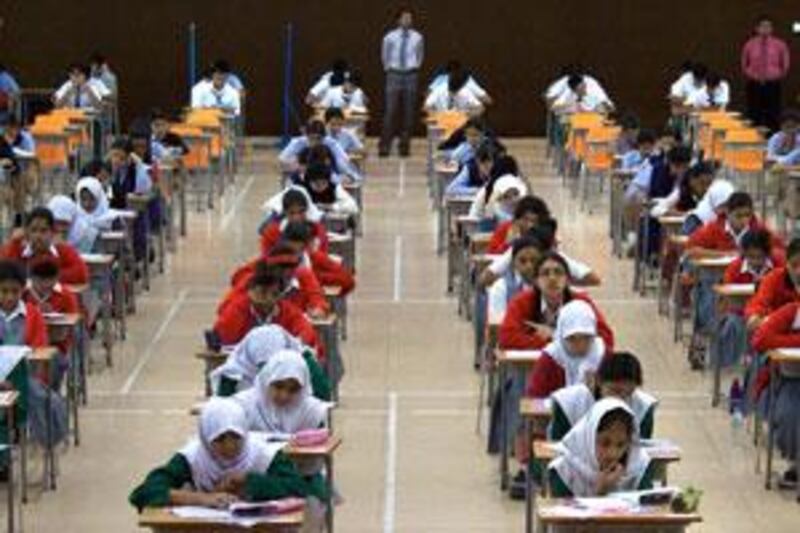ABU DHABI // The pressure on Indian pupils to excel at the public school exams that began this week is so intense that the education authorities have set up counselling for the students and their parents. The Central Board of Secondary Education (CBSE), based in New Delhi, announced a list of counsellors - including two at schools in Sharjah and Dubai - before the exams started, along with helpline numbers and online counselling services. The website includes a list of frequently asked questions on topics such as handling suicide, and high-risk behaviour such as drug abuse, self-harm and aggression. There is also a section aimed specifically at advising parents how to manage their expectations. The helpline was set up 15 days before the exams began and will close on the last day, April 2. It will reopen in May, on the day of the results. "It is for those who are under stress and 'hypered out'. It is all very confidential and even if parents want to come and join, we don't encourage it," said Ashok Kumar, chief executive officer of the Dubai Indian School, where one of the counselling centres is set up. "Parents in general do want that engineer and doctor. And then there is the three-letter word, MBA. These things have very strong connotations in the Indian scenario," said Mr Kumar, who is a member of the CBSE governing body. This year, about 1.45 million pupils will sit the exams across 22 countries. Of the 110 schools taking part in the GCC, more than half are in the UAE, where over 9,000 pupils are taking Grade 10 and Grade 12. Strong results in the exams, which are especially competitive at the Grade 12 level, are essential for direct entry into professional degrees such as medicine and engineering. "We cannot compromise with the syllabus because it has to be at par globally. We don't want to send substandard students abroad or to Indian universities," said Mr Kumar. Ashwathi Pavithran, 15, from the Abu Dhabi Indian School, who sat her Grade 10 social sciences exam yesterday, said pressure was immense among the top performers - the "toppers" - because their futures could hinge on marginal differences in their marks. "In my batch, we have a lot of toppers from the different sections. That's big-time pressure where the difference between toppers differs by a few decimal points," she said. "From school, there's not much pressure from teachers. My parents saw my brother go through the system and I saw him too, so we knew what to expect. But it is definitely hard for the students and their parents who take it for the first time." As part of the counselling, KNN Pillai, the principal of Sharjah Indian School and a recognised CBSE counsellor, talks to pupils about time management and eating habits. He advises them to eat a sensible breakfast - cereals and "brain foods" such as bananas and dried fruit. "I tell them, 'Don't spend two hours at a stretch sitting and studying.' We suggest 40 minutes. Then take a break and talk, or walk around and come back." Mr Pillai also urges group study sessions. Ashwathi agreed: "I have two friends, and we are among the top five toppers of the class. We go for tuitions together, we reference books together. Basically we study together and that has been the secret of our success. If you have the right mindset to approach it with a good and trusting group who help you, then success will be yours." Although there are no exam counselling centres in the capital, Vijay Mathu, the principal of the Abu Dhabi Indian School, said his school's counsellor was available throughout the year. Mr Pillai, who has worked in education for more than 30 years, said parental interference in selecting subjects in Grade 11 could cause significant stress among pupils. "Parents always think their child has to be a doctor or an engineer but no one talks about their child becoming a teacher. For example, if a student who should go to commerce is made to go to science or shows an aptitude for humanities, the stress starts there already. If the subjects are a child's own choice, he applies more time, gets good marks, enjoys it." sbhattacharya@thenational.ae
Pupils offered stress counselling
The pressure on Indian pupils to excel in their school exams is so intense that authorities have set up counselling.

Editor's picks
More from the national





